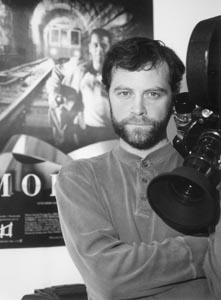Vanished
By David Templeton
IN ARGENTINA, in the mid-1980s, whenever Gustavo Mosquera was stopped for "routine questioning" by the military police, he was asked the standard questions: his name, his address, and his occupation. If you were lucky, that was as far as it went.
"Every day the cops were putting us up against the wall, asking for our IDs," Mosquera explains, "and asking for our ideas, too. Because ideas are what dictatorships are most afraid of." Whenever questioned, the young Mosquera would reply, honestly, that he was a student, currently enrolled at the University of Buenos Aires.
"Then they would want to know what I was studying," he continues. "So I would say, 'electronic engineering,' and they would let me go. 'An electronic engineer? Those are not dangerous.' "
But what Mosquera, who is now a part-time resident of Santa Rosa, would always fail to mention was his other course of study, his passion, his first love: In addition to his engineering degree, he was also pursuing a degree in cinematic arts--with dreams of becoming a film director.
"The military dictatorship had no use for filmmakers," he says of the since ousted cadre of military generals. "Artists of any kind--journalists, poets, writers, thinkers--had been disappearing. Thirty thousand people vanished during the military times. So my family begged me to have another occupation."
That other occupation may have saved his life; it most certainly made him a better filmmaker.
"I'd gained so much knowledge about electronics and engineering," says Mosquera, "and had come to appreciate mathematics and abstract ideas and the artistic works of people like M. C. Escher that it began to all come together in my films."
Case in point: Moebius.
Made two years ago while Mosquera was teaching at the University in Buenos Aires, Moebius is a small-budget allegorical thriller about a missing subway train. Financed by the university, it was made with the assistance of a hand-picked "workshop" team of students. The film features a mathematician hero, numerous references to advanced mathematical concepts, striking visuals imbued with an Escher-like circuitousness, and special effects shot with a camera that Mosquera, employing his accidentally acquired engineering skills, designed himself.
"What I did was I found a very old 35-mm camera in an antique store," he explains, reaching to pick up the case that holds the very same machine. "It was made in 1926. I basically took it apart and rebuilt it to do things it had never been intended to do." Unveiling the camera--a rickety, smoky-black thingamajig--Mosquera lifts it from the case and holds it up proudly. "I changed the motor, added a few enhancements, a new belt. This is the camera that I held while hanging from the front of the subway train, riding back and forth for hours, filming the tunnel shots. I am now very fond of this camera."
And audiences have become very fond of Moebius.
Michael Amsler
For the last two years, Mosquera has been globetrotting from film festival to film festival, with Moebius as his calling card. The film has picked up numerous awards and been enthusiastically received in Hong Kong, Singapore, China, and throughout Europe, and has also performed well at the Sundance and San Francisco film festivals. The movie will receive its local premiere this weekend at the Sonoma Film Institute, on the Sonoma State University campus.
ON THE SURFACE, it's an eerie and compelling mystery story set in the labyrinthine tunnels under Buenos Aires, loaded with nifty surreal tinges and a sly, satisfyingly metaphysical payoff. Underneath that, however, there is a poetic, richly symbolic exploration of Argentina's abiding national guilt over the vanishing of those 30,000 disappeared people, a subject on which the country's current democratic government has remained staunchly silent. As with the missing subway train, it is ultimately easier for the bureaucrats to forget all about it than to pursue the mystery further into the unthinkable darkness.
"The festivals have been a very big help," Mosquera allows. "They have increased the reputation of this film in ways that I could not have done on my own." While staying in Northern California--his fiancée, Terra Miezwa, is a longtime local resident--Mosquera has been meeting with various Hollywood movers and shakers, hoping to turn Moebius' indie glitter into a chance at mainstream gold.
But according to Mosquera, any such alchemy will have to be on his terms.
"I've been told by many producers," he says, "that Hollywood is not in the business of making movies for intellectuals. It's crazy. You'd think they would be so happy when someone brings them a well-written script, a script that tries for something deeper and better than all of the rest."
He sighs. "Hollywood believes that the audiences are stupid, but they are not. I know that they deserve better than much of what they've been getting."
While Moebius was made for only $250,000, his next film, he hopes, will be made, in English, for $3 million--still a pittance by Hollywood standards. Like Moebius, it will be a philosophical fable disguised as science fiction.
But first, there are a few more festivals to attend.
"I've been asked to take the film to Korea, to Calcutta," Mosquera says. "But I believe it is nearing the time to stop all of that. As much as I love Moebius, I am ready to make a new one.
"All I need is for some producer to say, 'Yes. Green light. Let's go.' "
[ Sonoma County | MetroActive Central | Archives ]
Copyright © Metro Publishing Inc. Maintained by Boulevards New Media.
![]()
 Filmmaker Gustavo Mosquera offers allegorical tale of guilt
Filmmaker Gustavo Mosquera offers allegorical tale of guilt  Rising star: Santa Rosa director Gustavo Mosquera has survived Hollywood's indifference and Argentina's brutal dictatorship to become an indie filmmaker.
Rising star: Santa Rosa director Gustavo Mosquera has survived Hollywood's indifference and Argentina's brutal dictatorship to become an indie filmmaker.
The Sonoma Film Institute screens Moebius on Nov. 13 and 14 at 7 p.m. at the Darwin Theater, Sonoma State University, 1801 E. Cotati Ave., Rohnert Park. Admission is $2.50-$4.50. 664-2606.
From the November 12-18, 1998 issue of the Sonoma County Independent.
![[MetroActive Movies]](/gifs/movies468.gif)